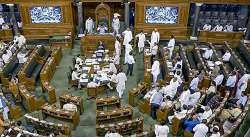What is Registration of Births and Deaths (Amendment) Bill? What are its main features, how is it relevant?
The Births and Deaths (Amendment) Act, since its inception in 1969, was not amended. Hence, make it more citizen friendly, there is a need to amend the Act, Union Minister of State for Home Nityanand Rai said.

New Delhi:
On August 01, the Lok Sabha passed the Registration of Births and Deaths (Amendment) Bill, 2023 which will also help create a national and state-level database of registered births and deaths. The Births and Deaths (Amendment) Act, since its inception in 1969, was not amended. Hence, make it more citizen friendly, there is a need to amend the Act, Union Minister of State for Home Nityanand Rai said.
Here are the main features of the Bill
- With the passage of the Bill, a birth certificate document can now be used for admission to an educational institution, issuance of driving licence, preparation of voter list, Aadhaar number, registration of marriage or appointment to a government job.
- This Bill will also ensure efficient and transparent delivery of public services and social benefits and digital registration.
- The bill will facilitate insertion of provisions for digital registration and electronic delivery of certificate of births and deaths for the benefit of the public at large.
- Not only this, but the bill will also provide for facilitating registration process of adopted, orphan, abandoned, surrendered, surrogate child and child to a single parent or unwed mother
- It will provide for issuance of a passport, issuance of an Aadhaar number and any other purpose as may be determined by the central government in order to enhance the public convenience and to avoid multiplicity of documents to prove date and place of birth in the country
- The bill provides for change of the ordering authority from magistrate of the first class or presidency magistrate to district magistrate or sub-divisional magistrate
